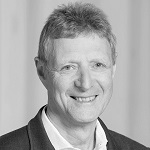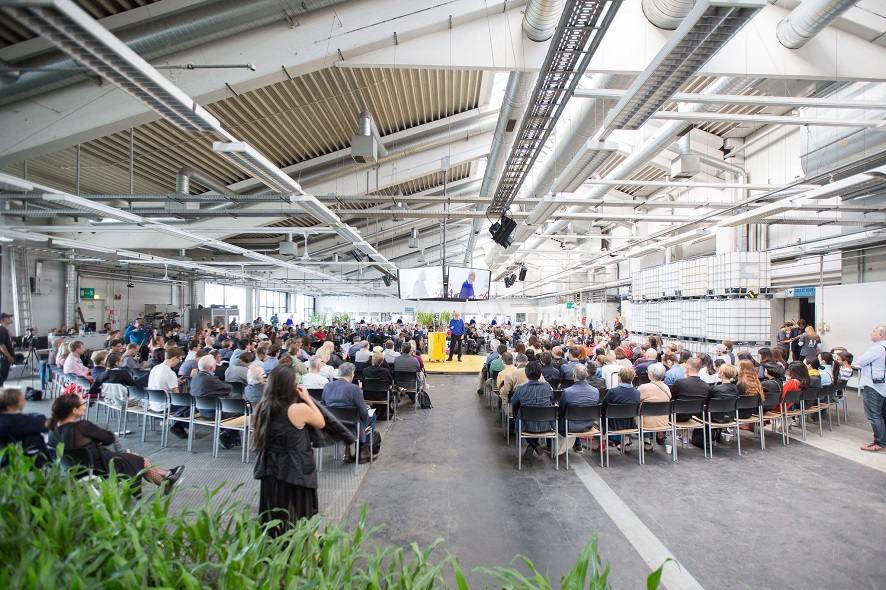“Data to the People – The Path Away from Digital Feudalism” is the title of biologist Ernst Hafen’s talk at the “Fakes, Responsibilities and Strategies” block of the Ars Electronica Festival’s Theme Conference on Friday, September 7th. In this interview, Ernst Hafen reveals that we live under a new digital form of feudalism, why data co-ops are necessary, and how data can foster progress.
Let’s start out with a preview of the talk you’ll be giving on Friday at the Theme Symposium’s “Fakes, Responsibilities and Strategies” block.
Ernst Hafen: I’m a biologist and I’ve been working for 30 years on the basic questions of biology, which I investigate using tiny fruit flies, which are good model systems for many fundamental biological problems. These processes were even present in the last common progenitor of insects and human beings. At some point, however, I realized that if we really want to understand Homo sapiens, if we want to know why you and I react differently to medications, then flies are simply too far removed. To answer this, we have to ask human beings.
Humans have the advantage that they can speak, and that they can now capture a huge amount of data—for example, via cell phone. I was fascinated by this! For example, a firm named 23andMe—whereby 23 refers to the 23 pairs of chromosomes that we all have in our cells—proceeds under the assumption that even though we can read the genome, we have no idea what it’s saying to us. But information from a large number of people would help us better understand how illnesses or reactions to medications come about. Accordingly, 23andMe offers genome analysis kits and asks people questions, and by answering, they become what you might call citizen scientists. Thus, with our data, we contribute to medical research. I was totally sold on this and, about 10 years ago, I gave my family genome analysis kits for Christmas. I was fascinated by this approach and I bought hundreds of such kits and resold them to biologists here at the Institute. Together with ethicists, we carried out studies about how to deal with the information yielded by these genome analyses. After all, people have this horrific scenario in their minds that a genome analysis tells quite a lot about a person. In reality, I’d find out quite a bit more about you by perusing your Facebook profile.
So, back then, I began to work with this data and the citizen science aspect. And I came to the realization that with every app, with every social network, and with these genome kits too, of course, we were actually giving away our data, but that this information constituted a treasure of great value! So how could we make better use of this data? And that yielded the data co-op concept.
So, tell us more about this.
Ernst Hafen: A cooperative belongs to the members; each member has a vote. This dovetails nicely with the fact that your genome and mine and that of every other man and woman in the world are extraordinarily similar. You have millions of letters in your genome and I do too; the difference between us is one out of a thousand of these letters. That’s all. Besides gender, naturally—you have two X chromosomes and I have an X and a Y. But aside from this small difference, we’re all very similar. If every thousandth letter in the novel “War and Peace” were erroneous, then this would not change the book’s meaning. But in the biological language, these tiny differences are important! We want to find out how these tiny differences can lead to human beings turning out so different or reacting differently to medications.
The co-op reflects this even distribution of data. In contrast to money, personal data are distributed very evenly—the number of paces, the number of heartbeats, the number of breaths of air, the quantity of food we eat. According to the cooperative principle, these figures belong to citizens, not companies like 23andMe or Google.
Data might be evenly distributed but only a few are profiting from them. Isn’t that proof of our increasing loss of sovereignty over our own data?
Ernst Hafen: Exactly, but we’re taking this as a given. For 10 years now, we’ve been using smartphones and free apps because it’s so convenient and because we pay with our data. Furthermore, there’s another very interesting aspect of data that money doesn’t have—data can be copied. A General Data Protection Regulation (GDPR) has been in effect since May in the EU and Switzerland, and this GDPR contains an Article 20 pertaining to data portability. If you switch to a different telecommunications provider, you can take your phone number with you—that’s portability. Data portability in the GDPR originally had the same objective. As a citizen, you have the right to go to any hospital, to your provider, to your physician, and demand a digital copy of your data. If it’s your cell phone number, then you can’t do that much with it, but with the copy of your personal data, you have incredible new power! You as an individual are the only person who’s authorized to gather your data and, with data portability, you now have the possibility to do so: genome data, medical data, the number of paces you’ve walked today, what you purchased at the supermarket, etc. This aggregation is what neither Facebook nor Google has the power to do. So if you exercise your right to data portability, and all other EU citizens do the same and possess a corresponding account that’s organized cooperatively and to which you can store your data—and if you can decide which data you wish to make available to whom—then we’re constructing a parallel infrastructure under citizen control. This leads to democratization of the personal data economy.
This is highly theoretical.
Ernst Hafen: That’s so, but, on one hand, we’re talking about how everyone’s anxious about this, but on the other hand, almost everyone has a smartphone. So, we have to implement this abstract idea in such a way that people also want this, that they derive a benefit from their data. In my speech, I’ll cite examples of how people, for altruistic reasons, are already prepared to donate their data for research purposes. But this can go a lot further. You might even have your own ideas about what to do with your data.
What has to happen so that we don’t run the risk of being overwhelmed by the quantity of data?
Ernst Hafen: It’s a little like in the Middle Ages, when the feudal lords didn’t pay salaries but instead provided protection and a roof over their subjects’ heads. Since then, we’ve learned that it’s better to have an individual bank account and to spend our own money. Now, these data are considerably more complicated than euros or Swiss francs, so there will emerge a totally new service sector to help us deal with our data just like financial advisors do now. There’ll be new occupations—for instance, data advisors, people who give us advice on where to invest our data. Today, we’re in a feudal system in which our overlords are Google, Amazon and Facebook. The case of Cambridge Analytica shows that this extends as far as influencing elections to government office. Now, we don’t have the slightest idea about which of our data have been captured. A copy of these data gives us an overview of our digital footprint. In the future, we’ll probably have to pay for these data services, just like we pay for a cup of coffee in a restaurant.
You mentioned that some anxiety prevails that corporations like insurance companies and banks will treat us differently or assign us to different categories depending on our data. How can we respond to that?
Ernst Hafen: That’s a legitimate question. If the charge for an XXL dress appears on your credit card bill, then I don’t need to see your genome to know that you’re overweight. Facebook Likes also provide a lot of data on the basis of which a profile can be created. It’s our mission as a society and a democracy to determine where this is taking us. In Switzerland, for instance, there’s universal health insurance; everyone’s insured for the same premiums. This is a social decision, a political decision. But that’s not how it is in many other countries. This is a sociopolitical discussion that we have to hold and that we’re already holding.
On the other hand, I believe that data such as medical data that we share for research purposes will enable us to accelerate our progress in personalized medicine and to discover why people react to medications the way they do and when diseases are in the process of proliferating. Our health care system is actually a sickness system that generates profits only when people are ill. Money spent on prevention is a mere fraction of what’s being spent providing health care. Individual data that can be captured with increasing precision—for instance, by sensors built into smartphones—can change all that. I predict that, in five years, the smartphone will be a medical device that you can also use to make phone calls! Needless to say, we’ll still need hospitals. But today, the cost of developing pharmaceuticals is astronomical, and they work on maybe 50% of those who take them. We don’t know why. If, however, we create an app like we’re doing right now with the University of Zürich’s Orthopedic Clinic that can regularly survey patients, then, suddenly, reports exist, and we can see where the most severe complications occur and which prostheses function best. This only works with our cooperation—if we want to participate.
That’s a very optimistic outlook.
Ernst Hafen: Sure. It doesn’t pay to be anything but an optimist! We have no further contribution to make; everything will be delegated. It doesn’t have to be this way, since we actually can contribute a lot to scientific research. And that doesn’t only have to be in the field of medicine. Consider Wikipedia, for example. No one thought there would ever be such a thing. And then it was just a matter of writing the articles. So just imagine what we could achieve when we go about fighting disease.

Ernst Hafen got his PhD in 1983 at the University of Basel’s Biology Center, and spent 1984-86 working on his post-doc at University of California, Berkeley. In 1987, he was appointed assistant professor at the University of Zürich, and was made a full professor in 1997. He served as president of the ETH-Swiss Federal Institute of Technology in Zürich 2005-06. He has been a professor in the ETH’s Department of Molecular System Biology since 2005. Ernst Hafen has made numerous trailblazing contributions to the field of developmental biology and cellular biology, including the characterization of genes and the corresponding signal paths that play a role in the determination of the cell’s life course and in the control of cell & body size. He has received several prizes and served on the editorial boards of various journals and on scientific committees. He is co-founder of evalueSCIENCE, a private consulting firm that issues evaluations and second opinions of R&D projects for life science firms, academic institutions and investors in conjunction with a standardized peer review process.
Ernst Hafen will speak at the Theme Conference on Friday, September 7th, 14:00-15:20 in the Conference Hall at POSTCITY Linz. For details, visit our program website.
To learn more about Ars Electronica, follow us on Facebook, Twitter, Instagram et al., subscribe to our newsletter, and check us out online at https://ars.electronica.art/news/en/.
